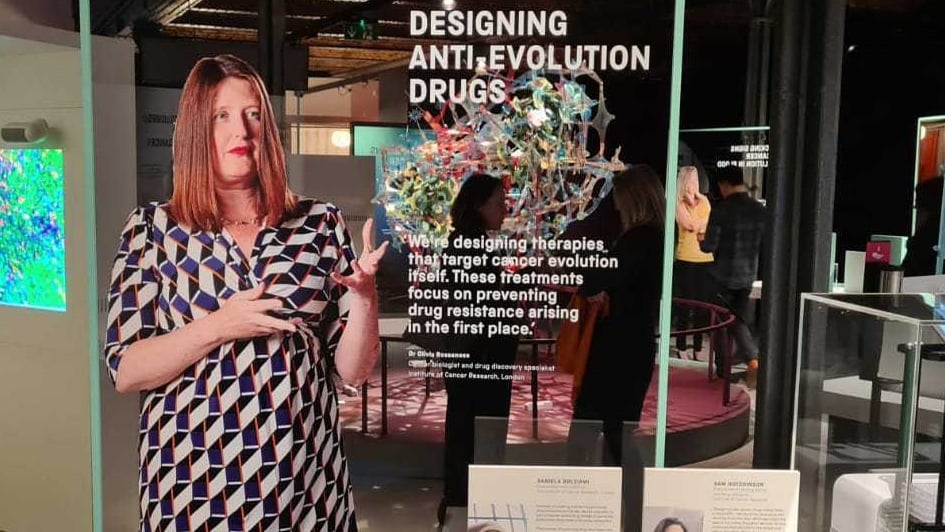
Image: An exhibit featuring Dr Olivia Rossanese, Director of the CRUK Cancer Therapeutics Unit, and her team's research into APOBEC inhibitors.
A new world-first exhibition by the Science Museum Group titled Cancer revolution: science, innovation and hope features a series of pioneering research projects being carried out at The Institute of Cancer Research, London.
The temporary exhibition is the first of its scope, scale and ambition anywhere in the world, and uses ICR research to help it tell a story of how scientific revolution is transforming cancer care.
It opens at the Science and Industry Museum in Manchester this week, and will move to the Science Museum in London in summer 2022.
Included in the exhibition are extraordinary objects that reveal monumental scientific discoveries made throughout the history of cancer research, as well as current research that aims to transform the future of cancer treatment.
The exhibition features a range of ICR research, from breakthroughs of the last few decades that have already transformed cancer treatment, to the cutting-edge research of today seeking to understand and overcome cancer evolution.
Tackling cancer's ability to evolve
The exhibition showcases an approach researchers are calling ‘evolutionary herding’.
ICR researchers have shown that it is possible to use artificial intelligence (AI) and advanced maths to forecast how cancers will respond when treated with a particular drug.
By selecting an initial drug treatment, they have found they can force cancer cells to adapt in a way that makes them highly susceptible to a second drug or pushes them into an evolutionary dead end.
Herding cancer cells in this way through sequential use of cancer drugs could either eradicate the disease or turn incurable cancer into a manageable chronic condition.
Featured alongside this research is the pioneering work of ICR scientists who are creating what researchers believe is the world’s first family of drugs to specifically target cancer’s ability to evolve and become resistant to treatment.
These potential drugs are being designed to stop the action of a molecule called APOBEC to reduce the rate of mutation in cancer cells, slow down evolution and delay resistance.
APOBEC protein molecules are crucial to the ability of the immune system to adapt to different infectious diseases – but are also hijacked in over half of cancer types to speed up evolution of drug resistance.
Researchers hope that a new class of APOBEC inhibitors could be given alongside a targeted cancer treatment to ensure it can keep cancer at bay for much longer.
Engineering viruses to kill cancer
ICR researchers are working to harness the body's immune system to kill cancer, using viral immunotherapy – work that also features in the new exhibition.
Talimogene laherparepvec (T-VEC), a modified form of herpes simplex virus type-1, multiplies inside cancer cells and bursts them from within. It has been genetically engineered to produce a molecule called GM-CSF, which stimulates the immune system to attack and destroy the tumour.
T-VEC was the first of a new wave of virus-based drugs to show benefit to patients in a major randomised, controlled phase III trial.
Targeting ovarian and breast cancer
The Science Museum Group also chose to showcase the ICR's innovative research underpinning the development of targeted drug olaparib, which is now transforming the lives of patients with ovarian, breast and prostate cancer.
Olaparib's origins lie in ICR research to understand the genetic causes of inherited breast in the 1990s, when our scientists tracked down the BRCA2 gene.
A decade after the identification of BRCA2, ICR researchers found that targeting a DNA repair protein called PARP was a potential way to kill cancer cells with a faulty BRCA gene. This helped lead to the development of olaparib and other PARP inhibitor drugs.
Transforming patients’ lives
Professor Paul Workman, Professor of Pharmacology and Therapeutics at the ICR, who was a member of the exhibition's advisory board and attended the launch, said:
“I’m delighted to see the ICR’s research showcased in this new, world-first exhibition. The fact that the Science and Industry Museum have chosen to highlight so much of the ICR’s research is a testament to how our discoveries have and continue to transform the lives of people with cancer. It’s been a real pleasure to be part of it.”
Cancer revolution: science, innovation and hope is open at the Science and Industry Museum in Manchester until March 2022. It will open at the Science Museum in London in May 2022.
